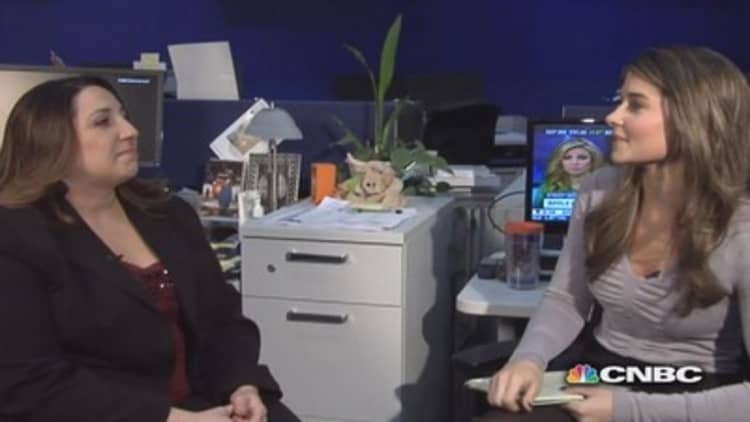
How much are you willing to give to get a good deal?
With retailers looking to gain an edge in a competitive consumer environment, they're turning to data and technology to customize the shopping experience, sending customers personalized promotions and offers through targeted emails and apps.
But the shift is not a one-way street. In order to reap the benefits of more customized offerings, shoppers have to part with some personal information—whether it's an email address, phone number or their location.
Despite recent breaches at stores such as Neiman Marcus and Target as well as a potential creep-out factor, the data are something that experts say shoppers are becoming more willing to offer—as long as they reap some benefits.
Retailers are "making sure that when they communicate directly with shoppers, that they have that perception of value versus spamming," said Giovanni DeMeo, vice president of global marketing and analytics for Interactions Marketing.
(Read more: 5 major problems retailers must fix in 2014)
According to a recent study by Cisco Consulting Services, 52 percent of shoppers are more willing to share their information if they feel like they get good value in exchange. That could be an email with a product they like to buy or an app that triggers coupons when walking in a certain section of the store.
A separate IBM survey in 2013 of more than 30,000 global shoppers found that the number of shoppers willing to share their current location via GPS nearly doubled compared with the previous year, to 36 percent. Twenty-two percent said they would give out their cellphone number to receive text messages from retailers.
There are a number of factors that influence how open certain people are to sharing information, and they don't always come down to age, DeMeo said. Some reasons include how frequently people buy online and where they live. That's because people residing outside of major metropolitan areas are more comfortable shopping on the Web, so they can avoid driving long distances to get products.
(Read more: Showrooming left in the dust as shoppers go online)
"A lot of it now is about shoppers taking control and retailers are giving shoppers that perception of control," DeMeo said. "Those who are exposed to it more and more are becoming much more desensitized to it."
DeMeo said that much of the creep factor associated with targeted promotions has waned, because retailers are becoming smarter with how they communicate, and customers are getting more accustomed to it. Still, according to Experian Marketing Services, only 30 percent of brands personalize emails sent totheir subscribers.
But it's a trend that's likely to pick up. According to Experian's 2013 Email Market Study, retailers with both a retail website and physical stores saw a 37 percent increase in unique open rates for emails with personalized subject lines, compared with emails sent during the same time period with nonpersonalized subject lines.
Retailers are also becoming more creative in personalizing the body of the email. These methods include sending an email when a shopping cart is abandoned, when an out-of-stock item becomes available or making suggestions based on past purchases.
Men's online clothing site Bonobos sent out an email highlighting its most popular items, in an effort to include shoppers on the company's narrative, said Craig Elbert, vice president of marketing. Even more outside of the box was a strategy used by Tinyprints.com, which over the holidays showcased a previously uploaded image in an email to the user.
(Read more: Without rebirth, malls face extinction)
"I've never seen anything that I felt has really gone over the line," said Liz Gould, director, strategic accounts at Experian. "I think if anything people need to be pushing the boundaries a little bit more."
This is especially true, she said, when speaking to the younger generation.
"I think they understand and they get it. ... People want promotions and they want emails that are relevant to them."

Still, some shoppers wonder about the relevance of certain emails they receive. A recent mailing by CVS told loyalty members where they ranked in terms of savings among the store's rewards card shoppers.
Francis Marone, who received an email saying he is in the top 6 percent of CVS coupon users in the country, said he didn't feel strange that the company knew this information about him, but wondered why the drugstore would want him to know where he ranked.
"Couldn't that information as likely put me off as make me want to break into the top 5 percent?" he wrote to CNBC.
CVS said it received positive customer response to the campaign over social media, and people were eager to compare where they ranked.
The goal for the company's loyalty program—which has about 70 million active customers—is to reward shoppers on their purchases, and to allow them to accrue deeper savings the more they spend, said Melissa Studzinski, vice president, customer relationship management. Therefore, it's important for customers to know how much they've saved over the past year.
"They open the emails because they feel like the information is important to them," Studzinski said, noting that the store has a 28 percent average open rate on emails. The industry standard is 16.4 percent, according to Experian.
There could be something to that philosophy.
"On the positive side, I feel that my high ranking is at least a testimony to my cashing in on my end of the bargain," said Marone, a Brooklyn, N.Y., resident. "At least I'm getting something in return—unlike all the people who give up their information and then never use the coupons they get."
—By CNBC's Krystina Gustafson. Follow her on Twitter @KrystinaGustafs.


